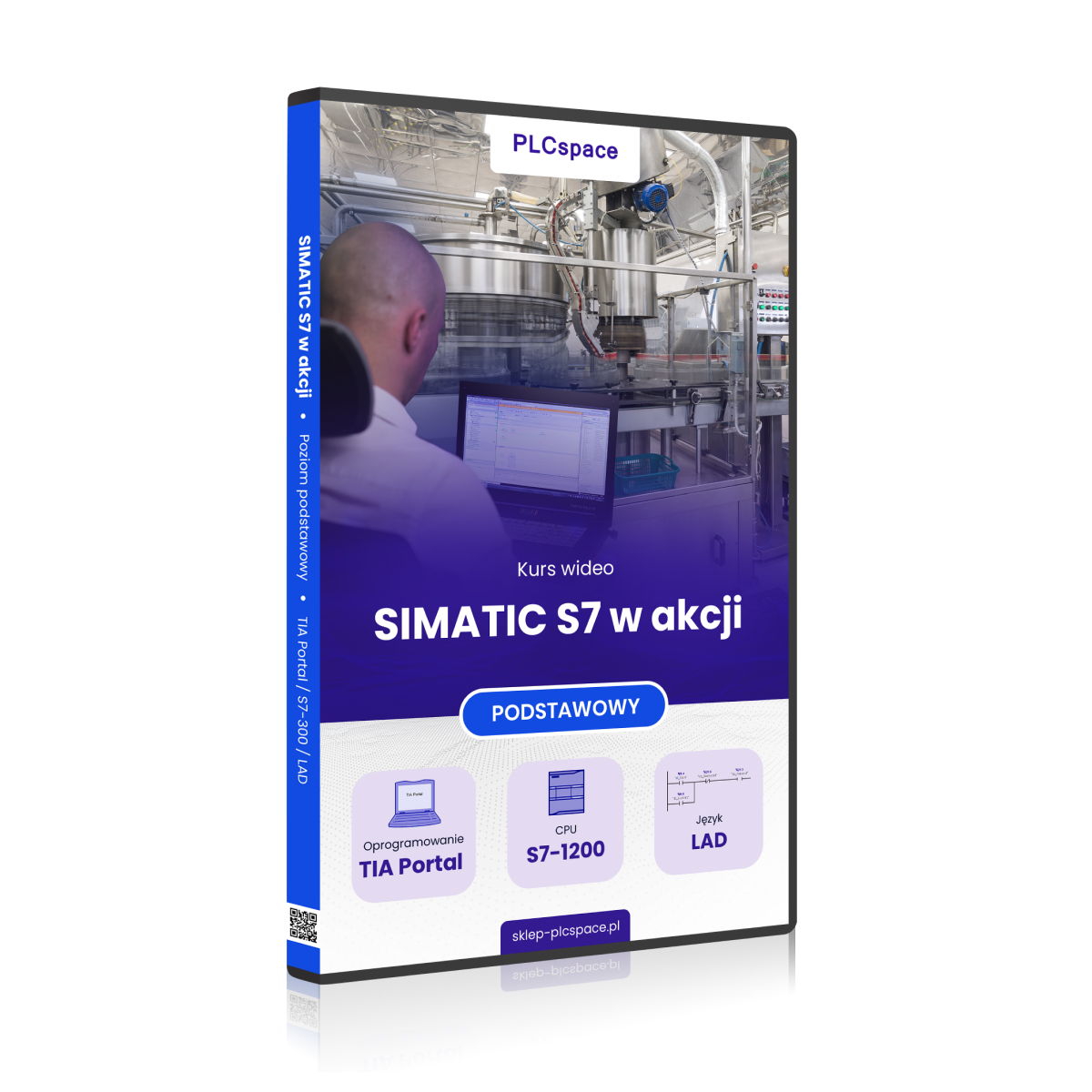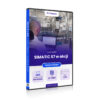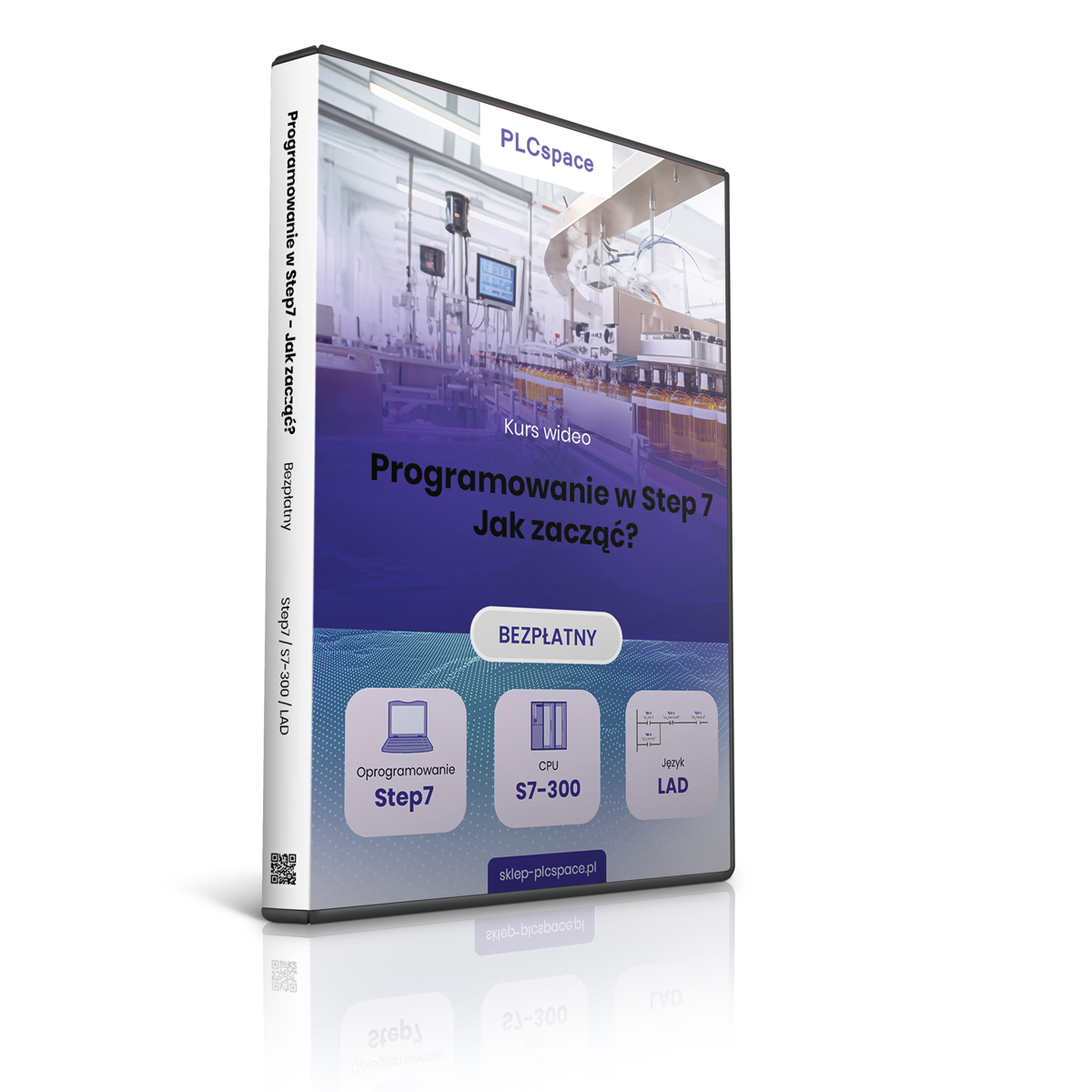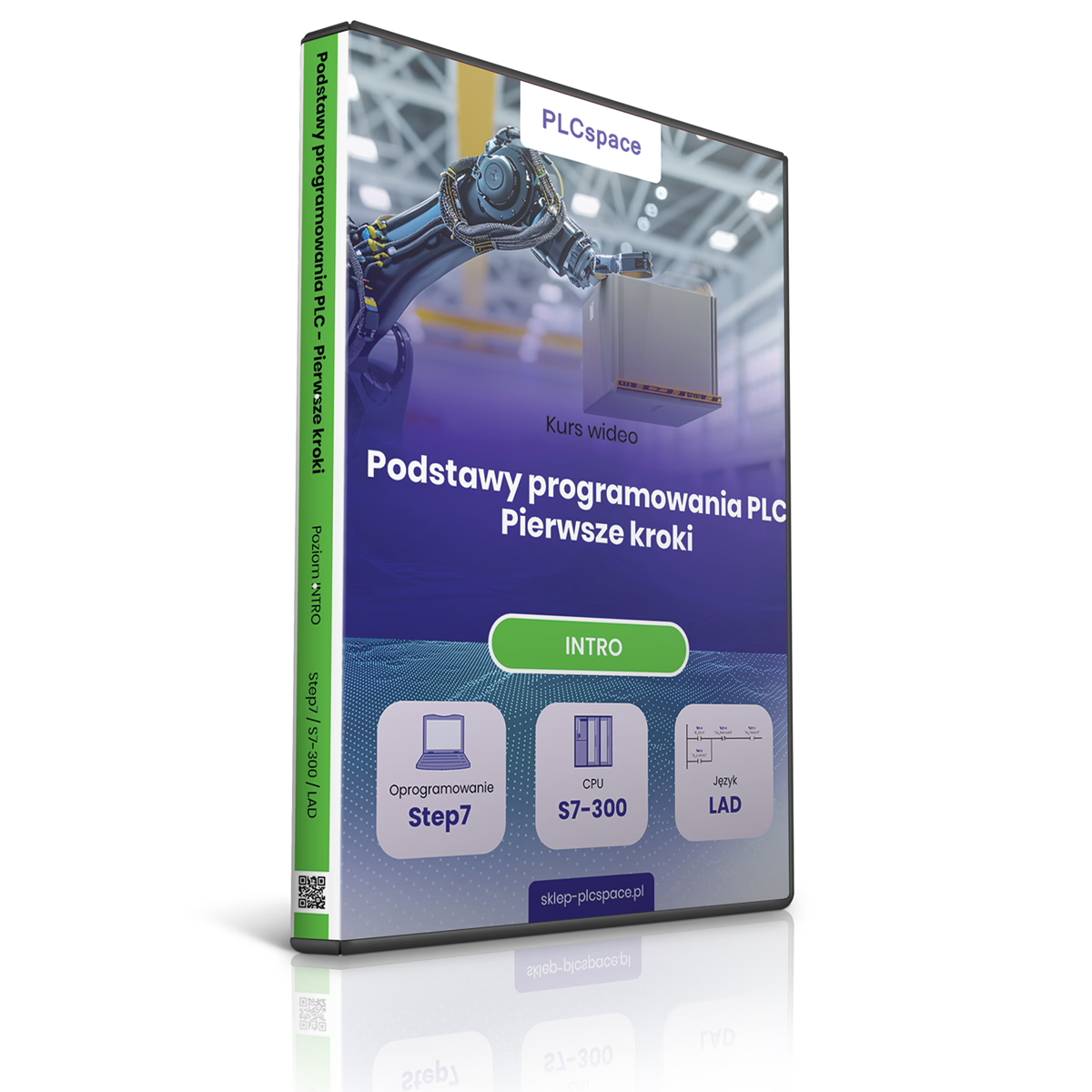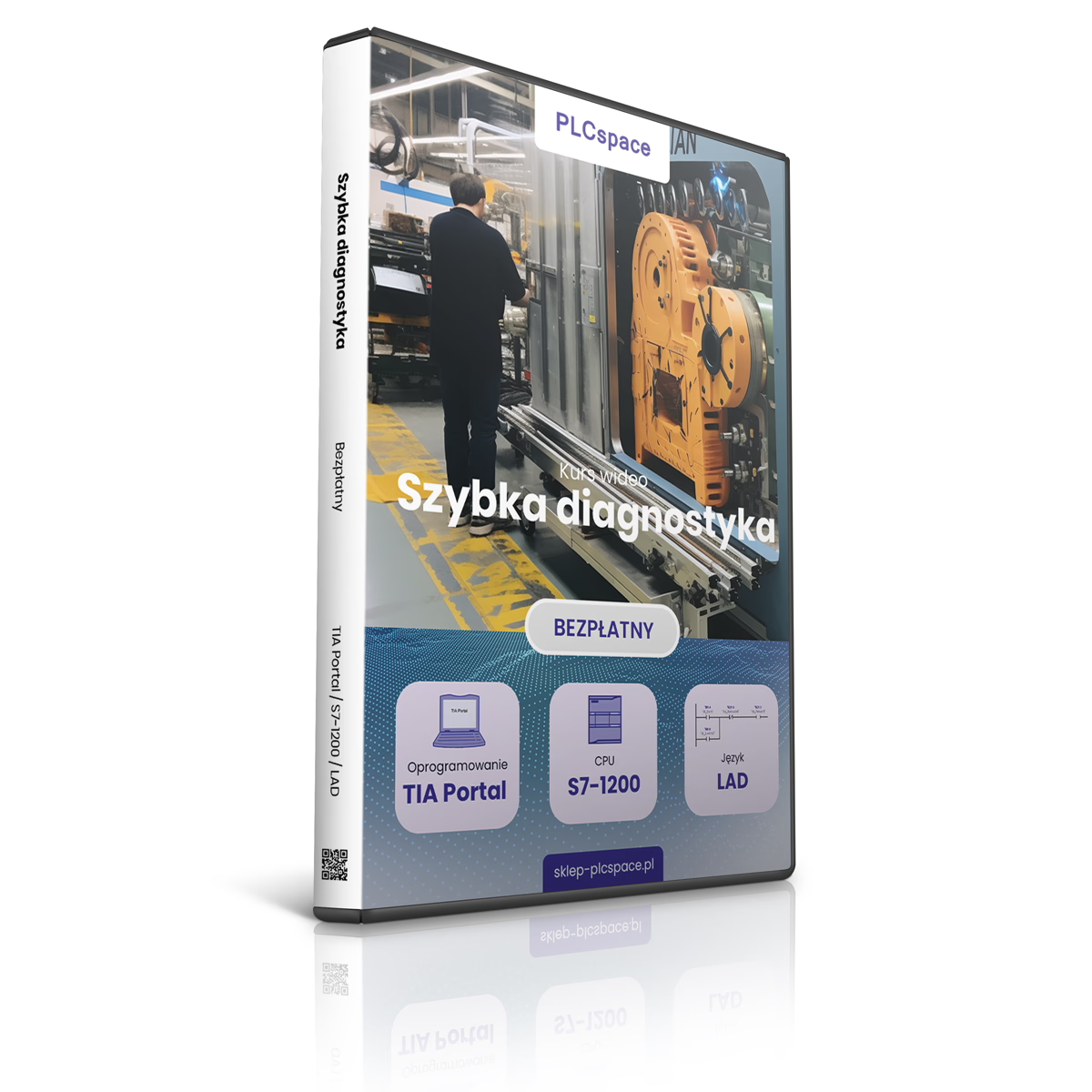SIMATIC S7 in action
- Level:
The development environment used in the course
- Software:
Core unit family used in the course
- CPU:
A set of rules that are used to develop programme code
- Language:
Frequency converter (inverter) family used in the course
- Drive
0.00 €
What do you get when you enrol on a PLC programming course?
Nie obawiaj się, że zostaniesz zarzucony skomplikowaną wiedzą, którą trudno Ci będzie przyswoić. Kurs ma na celu oswoić Cię z podstawami PLC. W ramach szkolenia otrzymasz starannie wybrane narzędzia:
SIMATIC S7 w akcji. Kurs programowania PLC Siemens, poziom od zera – oprogramowanie TIA Portal
Zastanawiasz się czy programowanie PLC jest dla Ciebie? Nigdy nie programowałeś sterowników przemysłowych ? Dobrze trafiłeś, ten bezpłatny kurs został przygotowany specjalnie dla Ciebie. Poznasz najpopularniejszy sterownik firmy Siemens, jakim jest SIMATIC S7-1200.
O czym jest kurs programowania sterowników logicznych PLC Siemens SIMATIC S7-1200?
Kurs wyjaśnia zagadnienia z automatyki i programowania PLC. Wykorzystywany jest popularny sterownik rodziny S7-1200 oraz środowisko programistyczne TIA Portal. Dowiesz się o podłączeniu elektrycznym sprzętu oraz instalacji oprogramowania. Zostaniesz wprowadzony w podstawy sterownika PLC. Poznasz i wykorzystasz w praktyce fundamentalne instrukcje programistyczne. Z tego kursu dowiesz się minimum, które jest niezbędne w tej dziedzinie automatyki przemysłowej.
Knowledge test:
Is this course for you? Take this test MULTIPLE choice to check it out.
Key information about the course
Poprzez wykonanie ćwiczeń przekonasz się, że kodowanie nie jest takie trudne.
W trakcie kursu wkroczysz w świat przemysłu i poznasz z kluczowe zagadnienia z branży.
Zdobędziesz wiedzy poprzez doświadczenie innych programistów.
Poznasz narzędzie, które pozwoli Ci przenieść się do zakładu przemysłowego i będziesz mógł ćwiczyć bez ograniczeń czasowych oraz konsekwencji (wystarczy, że wciśniesz przycisk reset).
Dostajesz kompletne kompendium wiedzy. Oszczędzasz czas i nie tracisz go na popełnianie podstawowych błędów podczas pracy.
Dlaczego warto wybrać nasz kurs automatyki przemysłowej i programowania PLC?
W Internecie znajdziesz dużo informacji o PLC i jego programowaniu. Ten kurs został przygotowany według autorskiej metody (wypracowanej na podstawie wieloletniego doświadczenia pracy z kursantami). Lekcje są ułożone w uporządkowany sposób (twórzą logiczny ciąg), gdzie zapoznajesz się z danym zagadnieniem (na zasadzie minimum teorii, maksimum praktyki). Jakie są główne składowe tego kursu?
Sample lesson / What you will do after the course
What is the Simatic S7-1200 controller programming training in the TIA Portal environment?
Ten kurs o PLC Siemens Simatic S7-1200 składa się z 9 modułów (każdy to oddzielna sekcja tematyczna). Informacje, które znajdziesz w tym szkoleniu przedstawia szczegółowy spis treści:
Najważniejsza informacja, że masz możliwość zrealizowania ćwiczeń u siebie na komputerze. Kurs jest skierowany dla każdego, jest od zera. Zawiera fundamentalne podstawy. Na bazie tego pojawiają się ćwiczenia oraz sposób ich rozwiązania. Dodatkowo znajdziesz zadania do samodzielnego rozwiązania.
Meta title: Bezpłatny kurs programowania sterowników PLC Siemens S7-1200
Meta description: Sprawdź kurs programowania sterowników logicznych PLC Siemens S7-1200, po którym automatyka będzie prosta.
-
Module 1 - downloading the development environment
- Lesson 1 - Registration on the Siemens website
- Lesson 2 - Which files to download
- Lekcja 3 – Systemy operacyjne vs TIA Portal
- Lekcja 4 – Instalacja oprogramowania TIA Portal z pobranych
plików - Lekcja 5 – Instalacja oprogramowania TIA Portal z płyty DVD
- Lekcja 6 – Najczęściej pojawiające się problemy
-
Module 2 - Licence
- Lesson 1 - Introduction
- Lekcja 2 – Aktywacja licencji TRIAL
- Lekcja 3 – Aktywacja licencji pełnej (full)
-
Moduł 3 - Podstawy - SIMATIC S7-1200
- Lekcja 1 – Różnice pomiędzy CPU
- Lekcja 2 – Budowa zewnętrzna – modele i typy
- Lekcja 3 – Budowa zewnętrzna – wejścia/wyjścia
- Lekcja 4 – Budowa zewnętrzna – złącze PROFINET
- Lekcja 5 – Podłączenie elektryczne – schemat elektryczny
- Lekcja 6 – Podłączenie elektryczne – zasilanie
- Lekcja 7 – Podłączenie elektryczne – przyciski
- Lekcja 8 – Podłączenie elektryczne – zadajnik
-
Moduł 4 - TIA Portal
- Lesson 1 - Introduction
- Lekcja 2 – Tworzenie projektu krok po kroku w TIA
- Lekcja 3 – Poruszanie się w środowisku programistycznym
-
Moduł 5 - Pierwsze połączenie z PLC
- Lekcja 1 – Konfiguracja PC
- Lekcja 2 – Wyszukanie PLC na sieci
- Lekcja 3 – Symulator PLCSIM
-
Moduł 6 - Operacje logiczne
- Lekcja 1 – Instrukcje programowania
- Lekcja 2 – Jak działa sterownik PLC
- Lekcja 3 – Logika bitowa
- Lekcja 4 – Zadanie praktyczne
-
Moduł 7 - Instrukcja SET RESET
- Lekcja 1 – Przypisanie – cewki SET RESET
- Lekcja 2 – Zadanie praktyczne
- Lekcja 3 – Przerzutniki SR oraz RS
- Lekcja 4 – Zadanie praktyczne
-
Moduł 8 - Zadania dodatkowe
- Lesson 1 - Task 1
- Lesson 2 - Task 2
- Lekcja 3 – Zadanie 3
Software and hardware used
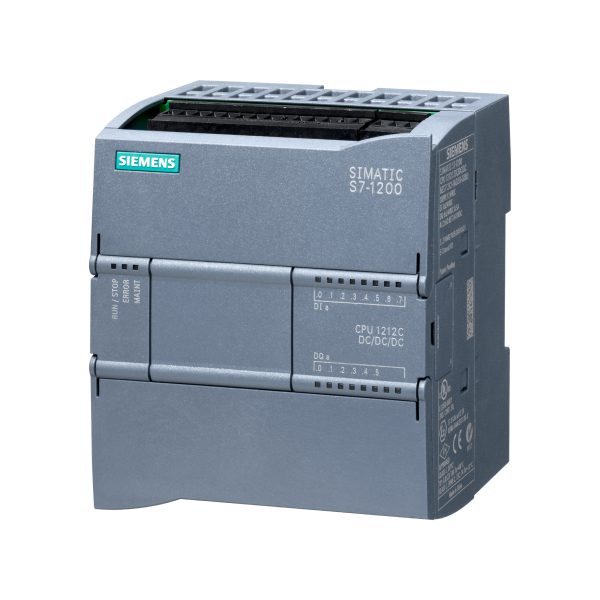
CPU S7-1200
The new controller, which has been developed as a successor to the S7-200, is characterised by slightly weaker parameters than the S7-300 family. Several CPU versions present in the family allow selection according to project requirements.
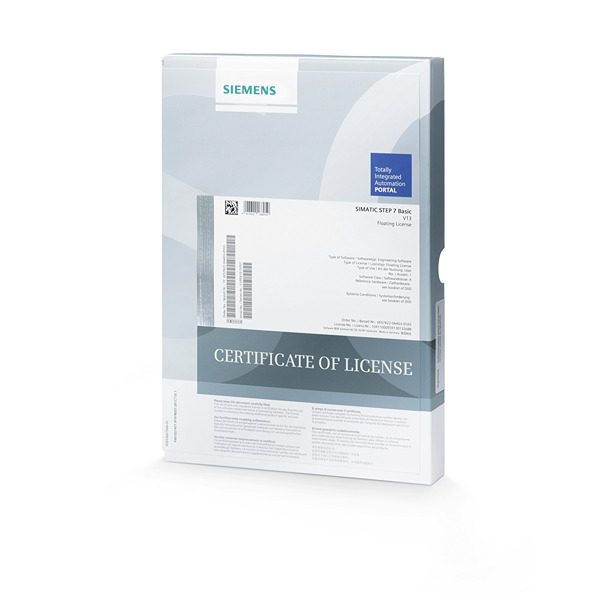
TIA Portal software
Totally integrated automation is a development environment that combines PLC (programming), HMI(visualisation) and startdrive(drive technology).
What will you be able to do after completing the course?
Poznanie przedstawionej tematyki programowania pomoże Ci, gdy zajmujesz stanowisko:
Musisz pamiętać, że „sucha” teoria, to za mało. Z tym kursem sprawniej przyswoisz wiedzę praktyczną, wystarczy że spędzisz czas przerabiając zawarty materiał, a następnie poćwiczysz samodzielnie.
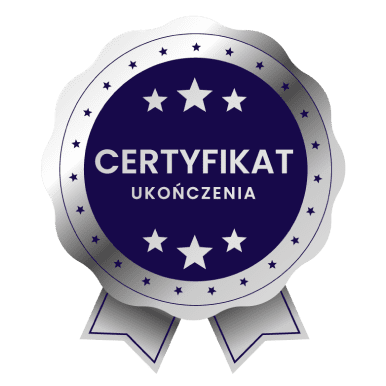

Guarantee
and certificate
If, after 14 days of purchase, you find that it is not for you, I will refund 100% of the course price. Upon completion of the course, you will receive a certificate in two languages - Polish and English.

Frequently asked questions
-
Do I need to have some basic knowledge of programming and PLC?
No. It's all in the course. We start from scratch.
-
Is it worth starting to learn with a Siemens PLC?
Yes. Siemens PLCs are in about 95% factories in Poland. The situation is similar in Europe. It is useful to have at least a general idea of this hardware and programming environment.
-
How long will I have access to the course?
Indefinitely.
-
Does enrolling in a course commit you to anything?
No. It is voluntary and at 100% for 0 PLN. It is possible to cancel at any time.
-
Is it worth learning PLC programming?
Everything nowadays lives up to automation to increase productivity and repeatability. Companies want to produce for 24 hours. You need machines and process lines to do all this. Someone has to program this, so you need PLC programmers. If you want to become a PLC programmer, this course would be a good way to start.
-
Why have I created a free course on PLC programming?
I think that anyone in the automation/electrical/mechanical field as well as pupils and students in these technical fields should familiarise themselves with this subject. Then you will be able to say whether this is for me. Whether I like it.
-
Who is this course for?
For people WITHOUT programming experience. For people who have no experience with Siemens PLCs. For all those who want to go step by step through the steps involved in the first commissioning of what is now the most popular PLC of the SIMATIC S7-1200 family.
Buy as a set and save
Select at least 2 courses from the list and the first free book item (three selections in total) and an automatic discount of 25% will be calculated in your basket.
If you want to find out more about a particular course, click on its name and the page will take you to its offerings.
Companies that have benefited from our courses




































Feedback from students
 Stanislaw
Stanislaw
What sets this course apart is the opportunity to acquire practical, concrete knowledge. Everything is clearly explained. Definitely recommended!
 Marcel
Marcel
After going through the course, I know what the components of the programming environment are and what to do step by step. Now I feel confident and know what I am doing
 Leon
Leon
Course delivered in a very accessible way. Contains a lot of interesting and useful information.
 Michael
Michael
I can honestly recommend the course. It is solid and factual knowledge. I will definitely be buying more.
 Victor
Victor
Thanks to the course, I have decided to go further in this direction. The goal is to look for a more challenging and better job
 Peter
Peter
The course prepared by Mr Tomasz is distinguished by its high level of content and meticulously prepared lessons. They are planned in a clear and sensible manner, making it easier to assimilate knowledge and return to the material if necessary. An additional advantage is the possibility of a free consultation.
 Nikodem
Nikodem
Definitely recommended! The facts themselves, no unnecessary dwelling on issues.
 Ignatius
Ignatius
This is my first course, certainly not my last. I am impressed with the substantive quality of the knowledge.
 Tymon
Tymon
Everything clearly explained, you can really learn a lot. Lots of practical information and examples to help you remember everything. In my opinion, it is worth using this form of learning because you can learn anytime and anywhere. It is practical and convenient.
You may also be interested in:
- Level:
The development environment used in the course
- Software:
Core unit family used in the course
- CPU:
A set of rules that are used to develop programme code
- Language:
Frequency converter (inverter) family used in the course
- Drive
0.00 €
- Level:
The development environment used in the course
- Software:
Core unit family used in the course
- CPU:
A set of rules that are used to develop programme code
- Language:
Frequency converter (inverter) family used in the course
- Drive
22.67 € 2.06 €
- Level:
The development environment used in the course
- Software:
Core unit family used in the course
- CPU:
A set of rules that are used to develop programme code
- Language:
Frequency converter (inverter) family used in the course
- Drive
22.67 € 18.09 €
- Level:
The development environment used in the course
- Software:
Core unit family used in the course
- CPU:
A set of rules that are used to develop programme code
- Language:
Frequency converter (inverter) family used in the course
- Drive
0.00 €
